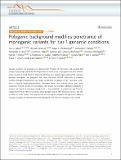Polygenic background modifies penetrance of monogenic variants for tier 1 genomic conditions
Author(s)
Fahed, Akl C; Wang, Minxian; Homburger, Julian R; Patel, Aniruddh P; Bick, Alexander G; Neben, Cynthia L; Lai, Carmen; Brockman, Deanna; Philippakis, Anthony; Ellinor, Patrick T; Cassa, Christopher A; Lebo, Matthew; Ng, Kenney; Lander, Eric S; Zhou, Alicia Y; Kathiresan, Sekar; Khera, Amit V; ... Show more Show less
DownloadPublished version (926.4Kb)
Publisher with Creative Commons License
Publisher with Creative Commons License
Creative Commons Attribution
Terms of use
Metadata
Show full item recordAbstract
© 2020, The Author(s). Genetic variation can predispose to disease both through (i) monogenic risk variants that disrupt a physiologic pathway with large effect on disease and (ii) polygenic risk that involves many variants of small effect in different pathways. Few studies have explored the interplay between monogenic and polygenic risk. Here, we study 80,928 individuals to examine whether polygenic background can modify penetrance of disease in tier 1 genomic conditions — familial hypercholesterolemia, hereditary breast and ovarian cancer, and Lynch syndrome. Among carriers of a monogenic risk variant, we estimate substantial gradients in disease risk based on polygenic background — the probability of disease by age 75 years ranged from 17% to 78% for coronary artery disease, 13% to 76% for breast cancer, and 11% to 80% for colon cancer. We propose that accounting for polygenic background is likely to increase accuracy of risk estimation for individuals who inherit a monogenic risk variant.
Date issued
2020Department
Massachusetts Institute of Technology. Department of BiologyJournal
Nature Communications
Publisher
Springer Science and Business Media LLC